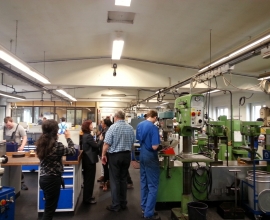Uruguay designs a vocational baccalaureate based on Germany´s dual experience
A Uruguayan delegation headed by the Ministry of Education and Culture (MEC) and the Vocational University of Uruguay (UTU) visits Germany to learn about the Dual Vocational Training system
As a result of diagnoses advanced by Uruguay's National Public Education System, by academic stakeholders and the National Institute for Educational Evaluation (INEEd), the current administration is moving forward in the construction and consolidation of various lines of transformation for current pedagogical approaches and the offer in the different basic education cycles (ages 3 to 17 years). Among the different proposals for diversifying the offer in secondary education, Uruguay has decided to move forward in the design of a Vocational Baccalaureate based on the dual methodology. In other words, a model that links traditional education with supervised training in companies, a model that was first developed in Germany.
The European Union's EUROsociAL Programme is supporting this design—which the MEC is also carrying out under an agreement with the Uruguay-Germany Chamber of Industry and Commerce—and to this end a technical visit was organised to Germany from 16th to 20th November to learn about the German Dual Vocational Training system and to advance in development of the proposal adapted to Uruguayan conditions.
The Uruguayan delegation—made up of representatives of the UTU and the MEC—thus had the opportunity to learn the structure of the system, its foundations, and the keys to its operation by speaking directly with the institutions involved in certain German cities: Bonn, Dusseldorf, Kerpen-Sindorf, Sankt Augustin, Troisdorf and Oberhausen.
The visit served to retrieve elements which can be of help in the work of adapting the system to the Uruguayan reality and which will be tried out at the pilot level in a sector that currently has a high demand for training in Uruguay: photovoltaic energy. These elements include curricular design, basic legislation, the structure of the system of stakeholders, examples of the structure of school-industry cooperation which guarantee the complementarity of theoretical knowledge and what is learned in the company.
IILA

